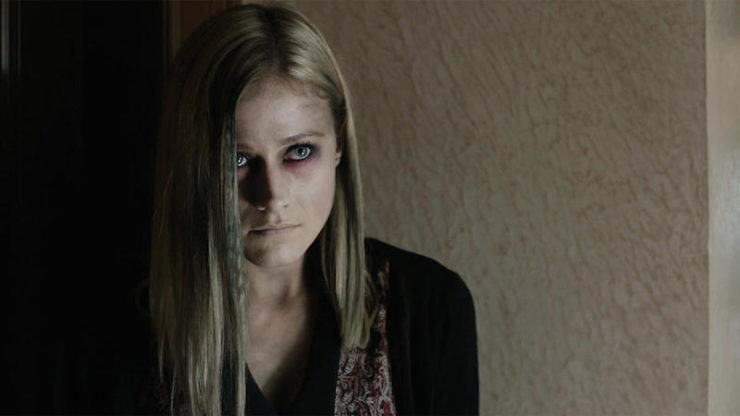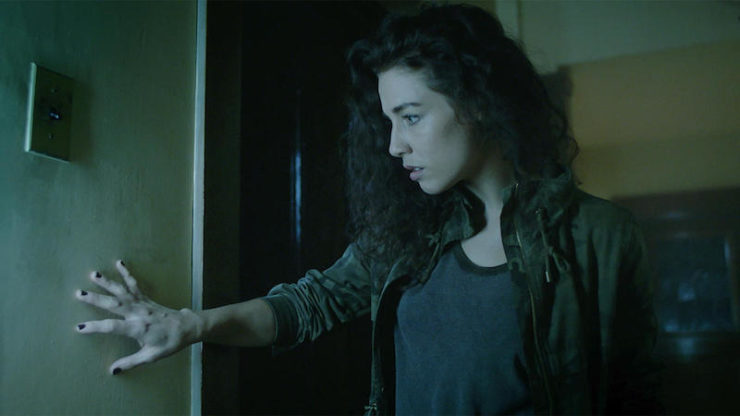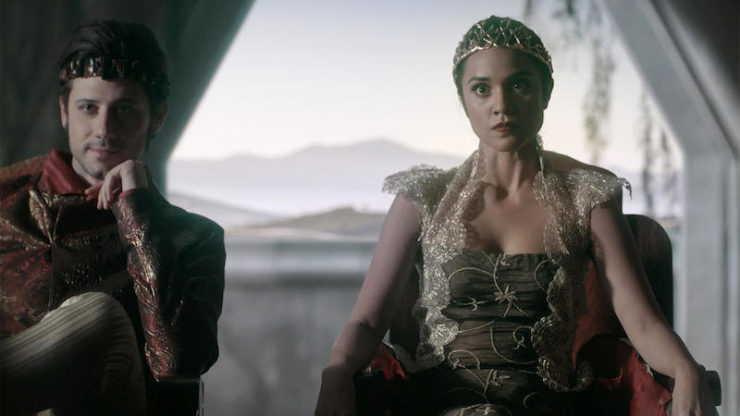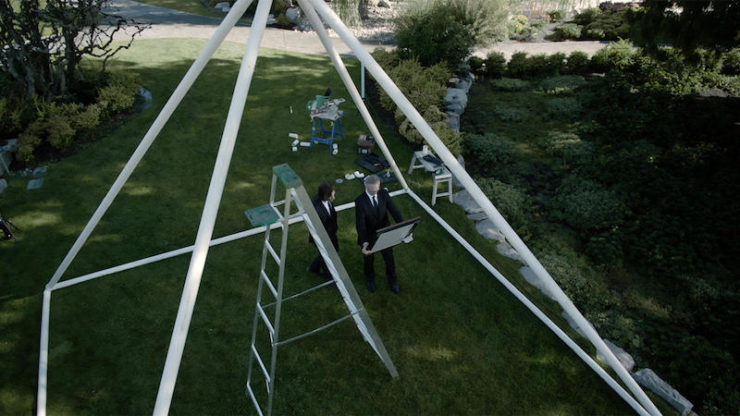The jokey name for this week’s episode is something of a misdirect: There’s very little joking around (except about geology), and little fun to be had in Fillory, or in our world. We’re just about halfway through The Magicians’ second season, and there’s still some groundwork to lay in order to get wherever it is we’re going. After last week, it’s hard to blame the show for chilling out a bit, even if this episode isn’t its best.
“It has to be some other dongs.”
“There are no other dongs.”
“The Cock Barrens”—which refers to a geologically … intriguing area in Fillory’s neighboring land of Loria—like all of this season’s episodes, tries to keep up with every character. But the balance feels off. It might seems weird to nitpick a magical show’s relationship to reality, but in both Quentin and Julia’s storylines, time and distance don’t make sense, and it’s distracting.
After failing to raise Alice’s niffin by doing a wonderfully awkward Cirque du Soleil dance at the location of her death in Fillory, Quentin heads back to our world for her memorial—and to face her parents. It’s no ordinary memorial, sure (there’s a sacrificial goat wandering around), but that still doesn’t explain the speed with which he and Daniel, Alice’s father, construct a sort of plastic-tubing pyramid in the backyard. It’s like no time passes between Quentin arriving at the memorial, them building the pyramid, and Daniel breaking his legs falling off a ladder—they’re wearing their suits the entire time.
This certainly isn’t the point of the sequence, but it’s a strange detail for the show to overlook. Alice’s parents, as we know from the first season, might kindly be described as “imperfect.” Daniel can’t overcome his fear of heights, and winds up confessing to Q about the moment he feels he lost young Alice’s trust. Stephanie only sees her own version of the truth, and can’t bring herself to complete a spell that requires accurately describing Alice—the true Alice, not her mother’s version of her.
What an unexpected position for Quentin to be in: He’s the person insisting that other people stop thinking of themselves, that they try to see Alice as she was, not as they wanted her to be. Q has to hold things together, despite his guilt and his broken heart, and he does it because ghost-Alice keeps appearing, guiding him, telling him secrets. She’s red-eyed and sooty; he’s barely functional. They make a great pair—and it’s not until the end of the episode that we understand just how much of a pair they are.

I was wrong about what happened to Alice. I thought niffin-Alice did die, and this was a different Alice, a ghost-Alice. But no. Niffin-Alice is just trapped in Quentin’s back tattoo. She’s been playing with him—and with her parents and their grief and guilt. “We’re stuck with each other,” she sneers at Q, and suddenly Olivia Taylor-Dudley’s casting makes more sense than it ever did. She’s sweet-faced, believable as the most capable girl in school, Brakebills’ own Hermione—and then she’s terrifying, flat and cold, having fun breaking her parents’ hearts all over again. Quentin has his very own villain, and he’s carrying her around like a backpack.
I like to think that we could somehow set Niffin-Alice on Reynard, but Julia is still doggedly hunting down the one woman who’s ever banished the trickster. How she gets from Brooklyn to what looks, in her spelled atlas, like the middle of California, I don’t know; how Kady gets there too, just in time to save Julia, stretches credulity even farther. But, again, not exactly the point. The point is Dana, the woman who banished Reynard decades ago. Julia goes to her for help, and gets exactly the opposite: Dana tells her she has to have Reynard’s child, that harnessing its power while giving birth is her only chance. No, Julia says. “Not your choice anymore,” Dana replies.
Dana is terrifying, and not just because she has some sort of magic-hiding creature locked up in a kiddie pool full of kitty litter. She has decided that the way she did things was the right way, and therefore the only way, and this little sour snippet of plot goes hand-in-hand with what happened to Julia last week, when she tried to get an abortion. People just keep trying to take Julia’s choices away.

Julia is having none of it, and neither is Kady. Who cares how she got there, really, when she gets that great punch in? Who cares where the haxon-paxon came from, if it’ll keep Julia hidden from Reynard? (The little moment when Julia understands that it’s trapped there, too—the sympathy in her face is perfect.) I’m less sure, though, how I feel about Dana’s fate. No one deserves having to encounter Reynard twice.
Back in Fillory, Eliot’s problems seem almost … mundane. He’s still trying to cope with his looming fatherhood (“Like I needed more people calling me daddy”), the FU fighter in the dungeon, his relationship with his wife, the general problems of Fillory and, oh yeah, the prince of Loria who shows up to make demands.
Making “Prince S” this Lorien’s name feels like a joke with no punchline (other than “Fuck your parents, dude”). On the one hand, S is a challenge for Fillory’s king and queen—a ruler with some practice at the job and no patience for these Earth-born newbs. On the other, he’s a bossy jerk with gender issues and a crappy plan for getting what he wants. (Penny’s underused this episode, but pairing him with the single-minded royal mapmaker was a minor stroke of genius.)
Phallic rock formations aside, there are some telling moments in Fillory this week. Fen explaining to Eliot that she had a life before he arrived—the she didn’t know if he would ever show up—is what the two of them need: honesty. She knows he’s not really into her. He knows, now, that there’s more to her than a naive girl who wants to serve him. “I’m a realist who wants you to succeed,” she says. “I want us to.”
Marriage: it’s complicated. And Eliot’s marriage is more complicated than most.

Eliot: “You could’ve been a little diplomatic.”
Margo: “By agreeing to marry a complete stranger on the spot?”
E: “I did it!”
M: “Well, that was different.”
E: “You’re right. This would only really be equivalent if S was a girl and you found pussy, you know, interesting in a sometimes-you-like-Thai-food kind of way and now it’s all Thai food forever, till you die.”
M: “No. He’s a man. Who seems arrogant and entitled and unclear on the concept of consent. I can’t imagine what could possibly go wrong.”
E: “Look, I’m not saying do it. It’s just, you’re a queen. I’m a king. We don’t necessarily marry for love. It’s part of the job.”
M: “Fine. I’ll talk to him, but only to negotiate us out of this epic clusterfuck. I’m staying a virgin.”
This conversation needed to happen. Margo hasn’t had to do much, or give up much, or struggle with the same thing everyone else has. She mostly gets to run around being efficient and occasionally bitingly supportive and, yes, also occasionally traumatized, but she hasn’t lost a friend or a lover or her hands, and she’s not trapped in Fillory. Eliot calling her out on not having to do the hard stuff is entirely fair. It’s fair for him to acknowledge that he did this isolating, difficult, life-changing thing—the very thing that she’s horrified to even consider. It’s also fair for her to say that it’s different, because she would go from being a queen to being an object, based on what S says. It’s not the most graceful of acknowledgments that every struggle is different, but I think that’s what the show has been (somewhat awkwardly) trying to get at all along: the traditional structures of so much fantasy only benefit straight men. Magical marriage is rarely so magical for anybody else.
In Eliot’s not-so-magical marriage, he and Fen are being more honest with each other, but trust isn’t fully established, and he probably still feels like more of her friends might show up to murder him at any moment. But they made a human together. And he’s starting to actually like her. None of this balances out the fact that—to continue his metaphor—Eliot does not want Thai food all the time, but if they can get their political shit together, they might be formidable. Especially with Margo on their side.
Margo who cannot resist a challenge. Margo who is no virgin queen, no how, no way, and will be delighted to prove that to S. The two of them trying to play each other is intriguing, but also a fraught mess: Who’s bullshitting whom? Is he just distracting her from figuring out his illusion? Does she think one night in the sack will change his mind about demanding access to the Wellspring? Is this all just meant to illustrate her impulsiveness, and how far she’ll go when she’s angry? Is a declaration of war really the most interesting place the Fillory plotline can go? I’m skeptical—for now.
MAGICAL TIDBITS
- “Your majesty, you said you wanted a unicorn milk latte.”
“I was joking! Wait, you milked a unicorn?” - I 100% love the moment when Penny and Eliot try to check in with each other while steadfastly refusing to admit that each of them might care how the other one’s doing.
- I can’t wait to see what’s going to happen when Penny calls in the favor Margo now owes him.
- “This whole marriage thing is absurd. You have no idea who the other person is. It’s dangerous.”
- Dana’s son is going to be—or maybe is already—relevant, right? She says, “He’ll never know who he really is. He doesn’t even know who I am. I made sure of it. It’s for the best. He’s a good man. He’s an influential man.” OH IS HE.
Molly Templeton only got a little distracted by Eliot and Margo’s over-the-top costumes this week, she swears.










